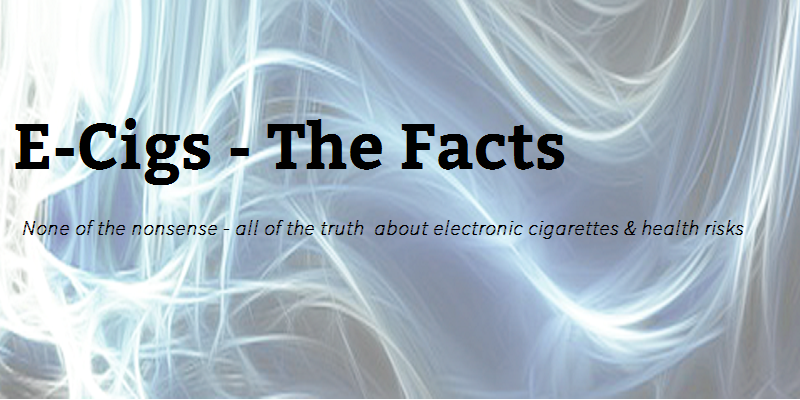The Media
Media – Friend or foe?
The newspapers and TV/Radio have often been less than favourable to e-cigs. I naively believed that journalists actually researched things (however minimally) that they reported on but experience has proven that they often pontificate on things on which they haven’t even done cursory research.
For our society this is a scary situation. I’ve listened to phone-in’s with seemingly knowledgeable participants and presenters only to realise that they are making statements with no basis in fact or support from research.
 I’m sure that most of this mis-reporting is down to laziness, some of it is because their proprietors advertisers insist on such spin and some of it is down to a hatred of tobacco & anything vaguely related to it.
I’m sure that most of this mis-reporting is down to laziness, some of it is because their proprietors advertisers insist on such spin and some of it is down to a hatred of tobacco & anything vaguely related to it.
When very senior medics and academics lie, however, my blood boils.
The sad facts are that there are people in positions of power who either choose to ignore the research because it does not fit their world view or they blatantly twist it to fit their unspoken agenda. Then there are journalists who publicise these views, take press releases as gospel without doing any proper research and sensationalise stories just to publish.
Our Beeb
Even organisations like the BBC are not immune. I often wondered why the BBC seemed to be positive towards the European Union. Their reporting didn’t always reflect the parliamentary discussions I’d watched in Brussels and I began to feel that there was a definite positive spin placed on EU items. In 2012, however, the Daily Telegraph reported that:
“…The BBC admitted in a letter to a Tory MP that it has received nearly £3million in grant money from the European Union over the past four years. Other grants totalling £16million came from local authorities across the UK. The money was spent on “research and development projects”. The broadcaster also disclosed that its commercial arm BBC Worldwide borrowed over £141million from the European Investment Bank since 2003…” (link)
Perhaps this wouldn’t be so bad had the BBC disclosed this information in its annual reports but it took a Freedom of Information request from The Spectator magazine to reveal it. (link)
Are they all corrupt?
 It’s not all about corruption, though. Journalists want to be told the Five W’s—Who, What, Where, When, Why … and how a story is relevant. They want to cover something that ‘moves the needle on the news’ and they need something that their audience is going to be interested in. The consequence is that they are unlikely to report the status quo because, although it might be useful to their audience, it’s probably not got the ‘who’ to give a human interest angle. Nor does it have impact as news. Give them an injured soul from a battery explosion and it’s news. Tell them you’ve found cancer causing chemicals in an e-liquid and they’ll be all over it.
It’s not all about corruption, though. Journalists want to be told the Five W’s—Who, What, Where, When, Why … and how a story is relevant. They want to cover something that ‘moves the needle on the news’ and they need something that their audience is going to be interested in. The consequence is that they are unlikely to report the status quo because, although it might be useful to their audience, it’s probably not got the ‘who’ to give a human interest angle. Nor does it have impact as news. Give them an injured soul from a battery explosion and it’s news. Tell them you’ve found cancer causing chemicals in an e-liquid and they’ll be all over it.
Corporate Pressure
Many journalists work for organisations which rely on advertisers and the organisations are not going to allow anti-pharmaceutical articles if one of their main customers is a pharma’ company. Similarly, some media organisations have a distinct left or right wing political bias and if a story fails to fit with the organisations ethos, it’s probably not going to see the light of day.
Time Pressure
It’s also fair to say that if a writer is working to a tight-timescale, the amount of research that will go into verifying an article is likely to be minimal and most journalists also have their ‘go to guys’ for comment – these aren’t always the best or most informed people but access to them is easy – they’re probably on speed-dial – and can be expected to make a usable quote.
Tobacco Products Directive – A case in point
 Looking back to the early stages of the Tobacco Products Directive, there were many potential stories – but few would have had appeal to the general population at the time. Tobacco isn’t a good story unless its negative and seemingly the EU were protecting health & commerce. Those of us who watched the proceedings in Brussels were appalled by what we saw – and what we knew would be the impact of this dogs dinner of legislation.
Looking back to the early stages of the Tobacco Products Directive, there were many potential stories – but few would have had appeal to the general population at the time. Tobacco isn’t a good story unless its negative and seemingly the EU were protecting health & commerce. Those of us who watched the proceedings in Brussels were appalled by what we saw – and what we knew would be the impact of this dogs dinner of legislation.
We told MP’s, MEP’s, the house of Lords and wrote to the media both about what had happened and what the result would be but the media coverage was almost non-existent. The then junior health minister, Anna Soubry, agreed, on behalf of the UK, to the EU position without parliamentary scrutiny, arguing later that she believed e-cigs were excluded from the legislation (which, of course, they weren’t). The media covered her appearance before committee & subsequent move to Defence but didn’t report the substance of the mess she’d agreed to.
 When the Medicines & Healthcare Regulatory Authority (MHRA) released their idea of a ‘light touch’ framework, many of us again wrote to newspapers (& the MHRA) pointing out that hundreds of small businesses would have to close as the projected costs of regulatory approval were staggeringly large. The fact that the MHRA is funded by pharmaceutical companies, who stand to lose out if e-cigs survive, was never reported in the mainstream press.
When the Medicines & Healthcare Regulatory Authority (MHRA) released their idea of a ‘light touch’ framework, many of us again wrote to newspapers (& the MHRA) pointing out that hundreds of small businesses would have to close as the projected costs of regulatory approval were staggeringly large. The fact that the MHRA is funded by pharmaceutical companies, who stand to lose out if e-cigs survive, was never reported in the mainstream press.
It’s only fair to say that vaping & smoking represent a small, but not insignificant, minority. It’s such a pity that, so far, the true story has rarely been communicated. That applies to the story of the true risks from smoking, second-hand smoke and electronic cigarettes. The press prefer sensation over objectivity.
Originally Published by Dave Upton 2015 – Reproduced by ocdz.co.uk with kind permission





